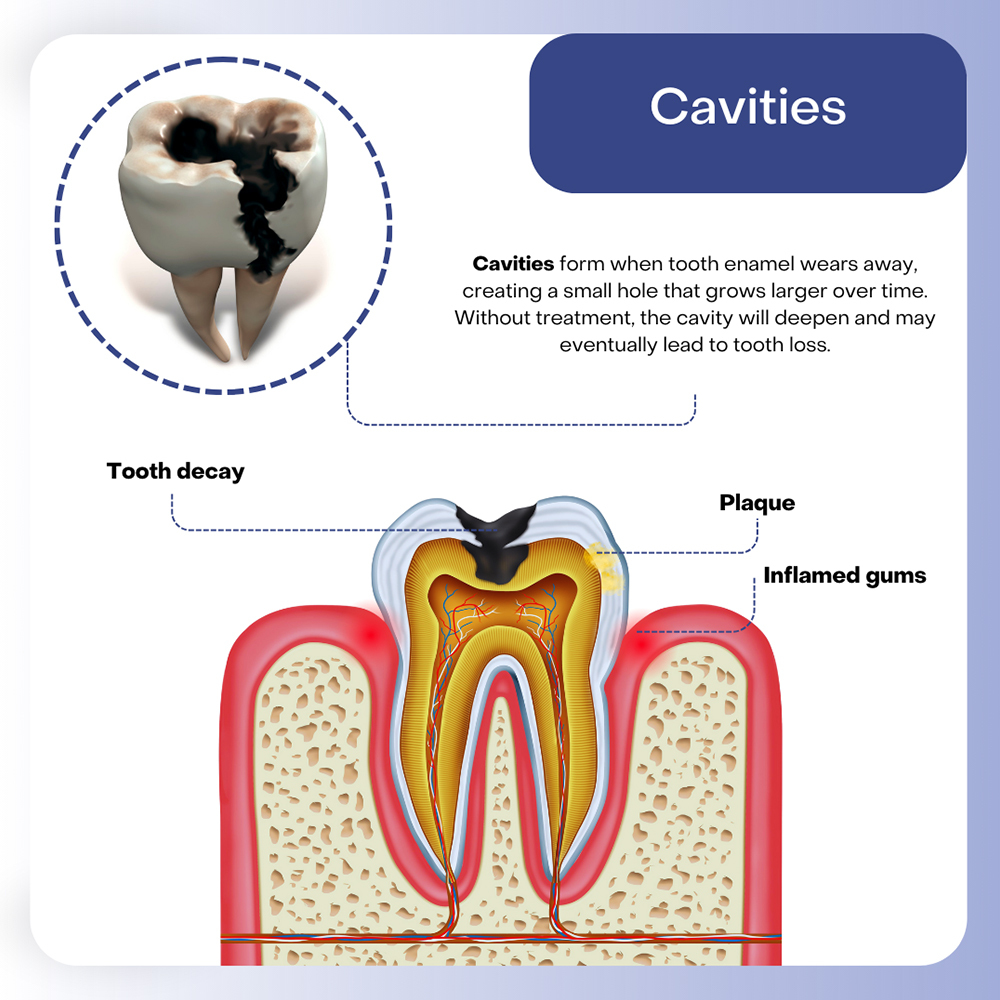Table of contents
While prevention is the best cure for tooth decay, you may be prone to cavities, which is why it’s best to visit your family dentist twice a year and call at the first sign of discomfort.

Although you only see the white outer covering of your teeth, the hard enamel, your teeth actually have multiple layers. When these layers develop holes due to trauma or decay, bacteria find a home into those holes. As the bacteria enlarge the holes, the loss of integrity compromises the tooth.
Cavities, also called caries or tooth decay, result from frequent snacking, improper cleaning, sugary drinks and sweet foods. An improper bite can also cause tooth decay because it makes cleaning your teeth more difficult.
Cavities start small, but if you don’t have them treated, they grow larger and eventually ruin the structure of the tooth, leading to tooth infection and potentially the need for an extraction. Dr. Victoria Kushensky, a family dentist at Bronx Dental Spa, offers the best methods of tooth decay treatment in Bronx, NY. He and his knowledgeable staff teach you the helpful habits you and your family can practice to prevent more cavities.
Cavity symptoms vary depending on its size and location. If you have a small cavity in the early stages, you may not even know it’s there. Larger cavities — or those closer to a tooth’s nerve — may cause other symptoms, such as:
Anyone who still has teeth can develop cavities. Certain individuals, however, show a greater tendency to develop tooth decay and cavities. Common risk factors for tooth decay include:
Cavities in adults and children can cause lasting complications. Bacteria breed infections that compromise your immune system. Infections cause nerve pain, swelling, discomfort and even fever. Sometimes, although rarely, infections spread from the mouth into the rest of your body with serious or life-threatening results.
Broken, chipped or cracked teeth with cavities often lead to tooth loss. And without restorative treatments, tooth loss causes shifting teeth that may result in chewing and bite problems. If you don’t have tooth decay addressed, you can expect to need more expensive dental treatment in the future.
Your Bronx, NY family dentist relieves your discomfort with one of several strategies. He treats your cavity by removing any decayed or compromised material. Then, he fills the hole with dental bonding material. The filling usually holds for 10 to 15 years.
If Dr. Victoria Kushensky can’t save your tooth, he needs to replace it completely. He has multiple options for replacing the tooth, including a dental bridge, dentures or implants. Your family cosmetic and implant dentist in Bronx, NY always strives to preserve your natural teeth, but if an infection or decay advances too far, that goal isn’t always possible.
Dr. Victoria Kushensky helps you implement a prevention plan to fight further damage or future tooth decay. Some suggestions include:
Your Bronx, NY dentist may perform other procedures in combination with common tooth decay treatments. If you need cosmetic dentistry treatment, for example, to improve your smile after substantial cavity treatment, you can receive the same quality service at Bronx Dental Spa in Bronx, NY. Contact us today!
Hutchinson Metro Dental: Victoria Kushensky, DDS
1200 Waters Pl, Suite M107
Bronx, NY 10461
(718) 822-8787